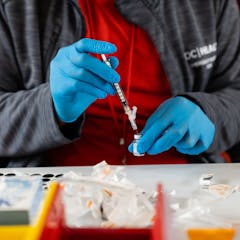
Articles on COVID-19 vaccines
Displaying 1 - 20 of 576 articles

New research confirms that COVID-19 vaccines are safe and effective at reducing the cardiovascular complications that are a hallmark of COVID-19 infection.

As you get older, you’re at higher risk of severe infection and your immunity declines faster after vaccination.

The idea that the Swift-Kelce romance is some sort of deep-state plot is perhaps gaining traction in far-right circles because it lines up with the political right’s broader agenda and beliefs.

The COVID-19 pandemic demonstrated the promise of using mRNA as medicine. But before mRNA drugs can go beyond vaccines, researchers need to identify the right diseases to treat.

The government says funding for COVID vaccines and antivirals are up for consideration next year. With so much unknown about the long-term impact of COVID, will cost become a barrier to access?

Studies show that health misinformation on social media has led to fewer people getting vaccinated and more lives lost to COVID-19 and other life-threatening diseases.

As the COVID-19 pandemic fades, we may debate whether public health responses could have been better. But first we need to understand what public health errors are — and are not.

Vaccine policies fall on a spectrum, from mandates to recommendations. Deciding what to use and when is not so much a science but a balancing act between personal autonomy and public good.

Newly approved and updated vaccines are the best tools available to combat COVID-19, the flu and RSV, as infections and hospitalizations tick upward and cold and flu season gets underway.

To build trust with an audience, scientists must demonstrate that they are competent experts. But they must also come across as warm, caring and human.

Only time and data will tell whether the CDC-recommended reformulated shots can stand their ground against the ever-changing SARS-CoV-2 variants.

Specific beliefs may have more to do with people’s vaccine views than their religious affiliation – but it depends on which vaccine you’re talking about.

COVID-19 vaccination has been shown to be safe in pregnancy, and protects both the mother and infant from severe disease. It’s now also clear that infants’ antibody protection continues after birth.

New analysis answers questions about the ongoing effectiveness of COVID vaccines: How well they protect against infection, hospitalization and death months after initial doses or after a booster shot.

The emergency status allowed the federal government to cut through a mountain of red tape, with the goal of responding to the pandemic more efficiently.

From cancer immunotherapy and antibiotics to GMO crops and pandemic surveillance, gain of function is a cornerstone of basic research.

COVID-19 is the third-leading cause of death in Canada, but it’s older people who are dying. That we accept this and carry on as if the pandemic is over reveals our ageism: We don’t value older people.

Vaccination is often combined with an injection. It can also take the form of a nasal spray: an approach that is still rare, but which could be effective against Covid. Here’s why.

President Joe Biden’s intention to end the national COVID-19 emergency will have long-lasting ripple effects on federal programs such as Medicare, Medicaid and the Children’s Health Insurance Program.

Many questions remain about next steps for US vaccine policy. But the FDA advisory panel’s hearty endorsement of a single-composition COVID-19 vaccine represents a pivotal step.
